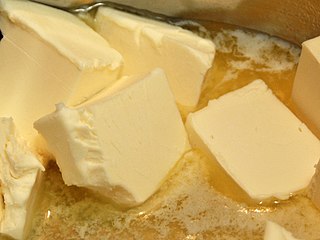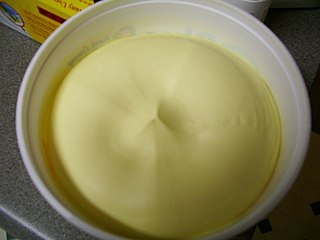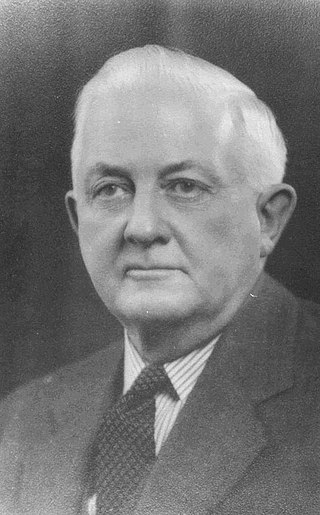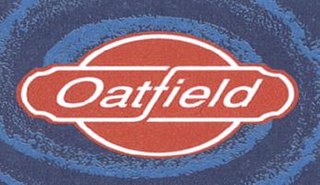
Butter is a dairy product made from the fat and protein components of churned cream. It is a semi-solid emulsion at room temperature, consisting of approximately 80% butterfat. It is used at room temperature as a spread, melted as a condiment, and used as a fat in baking, sauce-making, pan frying, and other cooking procedures.

Margarine is a spread used for flavoring, baking, and cooking. It is most often used as a substitute for butter. Although originally made from animal fats, most margarine consumed today is made from vegetable oil. The spread was originally named oleomargarine from Latin for oleum and Greek margarite. The name was later shortened to margarine.

The Tillamook County Creamery Association (TCCA) is a farmer-owned dairy cooperative headquartered in Tillamook County, Oregon, United States. The association manufactures and sells dairy products under the "Tillamook" brand name. Its main facility is the Tillamook Creamery, located two miles north of the city of Tillamook on U.S. Route 101.
Beatrice Foods Company was a major American food conglomerate founded in 1894. One of the best-known food processing companies in the U.S., Beatrice owned many well-known brands such as Tropicana, Krispy Kreme, Jolly Rancher, Orville Redenbacher's, Swiss Miss, Peter Pan, Avis, Milk Duds, Samsonite, Playtex, La Choy and Dannon.

Harry Burnett Reese was an American inventor and businessman known for creating the number one-selling candy brand in the United States; Reese's Peanut Butter Cups, and founding the H. B. Reese Candy Company. In 2009, he was posthumously inducted into the Candy Hall of Fame.
The Condensed Milk Company of Ireland Limited was an Irish manufacturer of dairy products and, in its heyday, the largest of its kind in the United Kingdom. Its most famous product was Cleeve's Toffee, a popular confectionery which continued to be sold in Ireland until the 1980s.

Oatfield was a chocolate and confectionery manufacturer located in Letterkenny, County Donegal, Ireland. The company was the oldest confectionery manufacturer in Ireland.
The Newfoundland Margarine Company was Canada's first oleomargarine manufacturing company, and a leading producer in the Dominion of Newfoundland and after 1949, the province of Newfoundland and Labrador. It was founded by Sir John Chalker Crosbie in 1925 and was one of three margarine plants established in Newfoundland during the early 20th century. With the expertise of George Ehlers, a Danish chemist, the Crosbie family grew the firm into the largest margarine manufacturing firm in Newfoundland. The Newfoundland Butter Company through acquisition and merger over the years with the other two manufacturing plants was eventually sold to Lever Brothers of England in 1937 and became a subsidiary of Lever Brothers of Canada.

Prairie Farms Dairy is a dairy cooperative founded in Carlinville, Illinois, and now headquartered in Edwardsville, Illinois, a suburb of St. Louis. As a dairy cooperative, Prairie Farms receives milk from producers and converts it into many different products, including cheese, butter, ice cream, sour cream, cottage cheese, various dips, yogurt, and fluid milk. Prairie Farms also produces and sells juices, flavored drinks, and pre-made iced tea.

Robinsons Magnolia is a shopping mall owned and operated by Robinsons Malls. The mall opened on August 13, 2012. It is the 32nd mall opened by Robinsons and the company's third mall in Quezon City. It has a gross floor area of 108,000 square metres (1,160,000 sq ft). Robinsons Magnolia is adjacent to the four-tower Magnolia Residences where the iconic Magnolia Ice Cream production plant once stood.

Rasmus Otto Mønsted was an industrialist and margarine manufacturer from Denmark.
Vermont Creamery is a creamery and artisanal cheese and butter-maker in Websterville, Vermont, USA. It was founded in 1984 by business partners Allison Hooper and Bob Reese. Previously known as the Vermont Butter and Cheese Company, the company adopted its current name in 2013.

Vegan cheese is a category of non-dairy, plant-based cheese analogues. Vegan cheeses range from soft fresh cheeses to aged and cultured hard grateable cheeses like plant-based Parmesan. The defining characteristic of vegan cheese is the exclusion of all animal products.

Lewis Road Creamery is a boutique New Zealand dairy company, located in northern New Zealand. They produce a range of milk products, including varieties of milk, cream, ice cream and butter. The company is best known for its brand of chocolate milk, which in 2014 sparked a frenzied, nationwide shortage.

The Agen Warehouse, also known as the 1201 Western Building is an historic former warehouse building located at 1201 Western Avenue in Seattle, Washington. Originally constructed in 1910 by John B. Agen (1856–1920), widely considered the father of the dairy industry in the Northwest, for his wholesale dairy commission business, it was designed by the partnership of John Graham, Sr. and David J. Myers with later additions designed by Graham alone. After years of industrial use, the building was fully restored to its present appearance in 1986 for offices and retail with the addition of a penthouse and was added to the National Register of Historic Places on January 23, 1998.

Miyoko's Creamery, formerly Miyoko's Kitchen, is an American food producer founded by Miyoko Schinner in 2014.

Dairy is a major industry in the U.S. state of Wisconsin. Being known for its dairy production, the state is often called "America's Dairyland." The industry is prominent in official state symbols—being displayed on the state's license plates, state's slogan, and on the state quarter.

Cave Austin and Co., Ltd was a chain of grocery stores and cafés in the southeast of England. During its seventy-year history it grew to some fifty branches in Kent, Surrey, Sussex, and much of South East London. Cafés were in several seaside towns such as Deal in Kent and Hastings in Sussex.

















